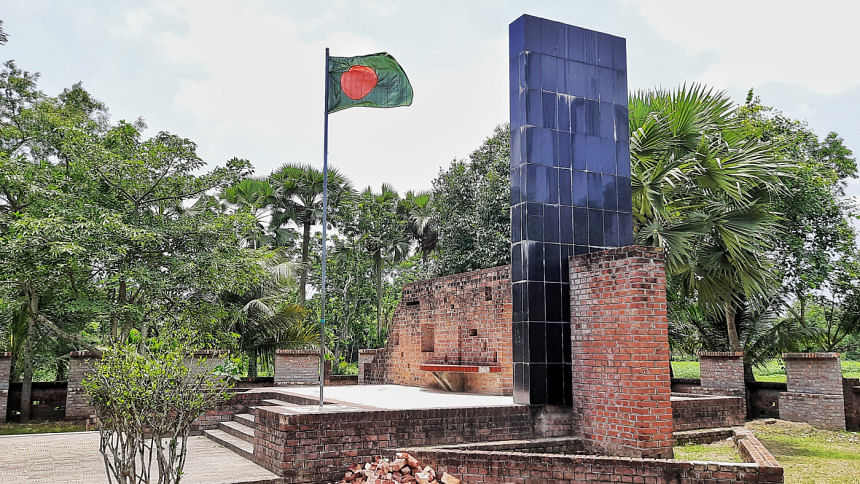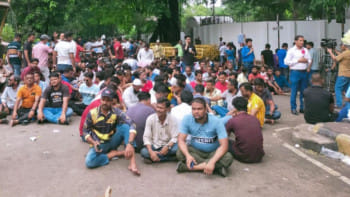Chuknagar: A forgotten massacre

It was a massacre orchestrated in broad daylight that turned rivers red and left a village buried under heavy silence.
On May 20, 1971, Chuknagar, a quiet border village in Dumuria upazila of Khulna, became the site of a brutal yet overlooked massacre during Bangladesh's Liberation War.
In just a few hours, over 10,000 people were gunned down by the Pakistan Army as they waited to cross the border into India.
The magnitude of the horror, witnessed by thousands and endured by many survivors, remains etched into the memory of the people of this region.
Yet, more than five decades later, the Chuknagar massacre remains largely forgotten by the national narrative, with little done to preserve the memory or honour the victims properly.
The locals demanded that May 20 be officially declared as Chuknagar Day and observed nationally.
They also called for the establishment of a full-fledged memorial complex, including a rest area and necessary facilities for visitors.
However, even after 44 years, it has not been constructed.
The demands remain unfulfilled.
In May of 1971, as the Pakistani military crackdown intensified across the country, Chuknagar became a vital transit point for refugees from Khulna, Bagerhat, Barishal, and even Faridpur. People travelled in droves through the Bhadra river, hoping to find shelter and eventually safe passage into India.
By May 18-19, an overwhelming number of people had congregated in and around Chuknagar. They came from Mongla, Sharankhola, Rampal, Dacope, Batiaghata, and further beyond, exhausted, hungry, and desperate for safety.
Sirajul Islam, a student leader at the time who had witnessed it all take place, told The Daily Star, "By the morning of May 20, thousands of people were packed into Chuknagar. Suddenly, around 10:00am, a Pakistani army vehicles arrived at the Jhautala area of Maltia intersection."
"They immediately spread out in three directions, towards Malopara-Raipara, the bazaar, and the riverbanks, and opened fire indiscriminately."
Panic-stricken people tried to escape. Some ran to the fields, others climbed trees or hid in boats. None were spared.
The systematic carnage continued till 4:00pm.
From Patkhola Beel to Chuknagar School, the temple to Football Ground, and along the Bhadra and Ghangrail rivers—corpses lay everywhere.
The Bhadra river turned into a sea of blood.
The survivors still cannot forget that horrific day.
Nimai Chandra Roy, a retired school teacher from Khalsibunia Kachari Bari in Batiaghata upazila, said, "We reached Chuknagar on foot a day earlier. Hundreds of families like us came from different places and settled in the vicinity of Chuknagar Bazar. Some were finishing their morning cooking and preparing for lunch. Some were packing their belongings and preparing to leave for the border via Satkhira. That's when the Pakistani military started firing from three directions. Our nine-member family got separated. We lost our way and took shelter in the nearby river."
Surendranath Bairagi of Aushkhali village in Batiaghata had lost all five of his brothers. "I ran to the river, but they were killing people there too. Later, my wife told me that none of my brothers survived," he said with tears in his eyes.
But perhaps the most haunting tale is that of Rajkumari Sundari Dasi. She was just six months old when she was found clinging to the body of her mother amid a pile of corpses. Ershad Ali Mohol, who had gone to search for his father's body, found her and handed her over to his friend, Mandar Das, who raised her. Sundari never knew her real name or her parents' identity. The massacre severed her ties with her past forever.
With thousands dead, there was no way to give everyone a proper burial. The bodies were dragged and dumped into the Bhadra river.
ABM Shafiqul Islam, a former principal of Chuknagar College and an eyewitness, said, "Around 44 labourers from a jute warehouse were assigned to immerse the bodies. The water became unusable. For months, we couldn't even think of fishing or collecting water from the river."
Gouranga Nandy, a writer and researcher said , "April and May were the cruelest months in this region. But what happened in Chuknagar is unprecedented. Nowhere else in the war was such a large number of people killed in such a short span of time."
Chuknagar was not just a massacre. It was an attempt to erase people's hope, to crush the spirit of a new nation. And yet, it also stands as a testament to resilience.
Despite its magnitude, the Chuknagar massacre remains on the margins of national memory.
The site has been poorly preserved. A memorial named Chuknagar Shaheed Smritishoudho was built in 2006, after the government bought 78 decimals of land.
But even now, the spot lacks basic facilities for visitors. No proper shed exists, no clear signs, and for many years, no detailed information was available for those who came to pay homage.
"There is no other genocide of this scale in 1971 that has remained so under-recognised," said Gouranga Nandy.
Mohammad Al- Amin, Upazila Nirbahi Officer (UNO) of Dumuria, told The Daily Star, "I have sent a letter to higher authorities, requesting initiatives to observe Chuknagar Day both nationally and internationally. We will also ensure the availability of washroom and drinking water facilities for visitors."
"We plan to prepare and display a written account that will provide a concise overview of the Liberation War and the Chuknagar massacre for public awareness," he added.

 For all latest news, follow The Daily Star's Google News channel.
For all latest news, follow The Daily Star's Google News channel. 



Comments